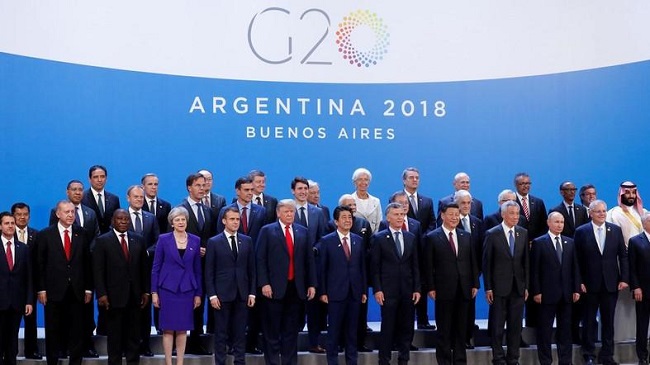- Telecommunications Giant Vodafone Leaves the Libra Association
- Group of Central Banks Assesses Developing Central Bank Digital Currencies
- South Korea Might Impose 20 Percent Tax on Cryptocurrency Profits
- Report: Terrorists Increasingly Use Crypto to Raise Funds Anonymously
- Canadian Securities Administrators Subject Crypto Exchanges to Securities Laws
G20 Countries Opt to Regulate Cryptocurrency to Battle Money Laundering and Terrorism

Money laundering in general and money laundering via cryptocurrency in particular is something that preoccupies any political leadership of industrial nation in the world. The decentralized nature of cryptocurrency, however, makes it very difficult for individual states to fight such cyber-crimes alone, and global cooperation is certainly necessary.
This is why the participants of the G20 summit in Buenos Aires, Argentina have agreed together (which in itself is quite impressive) to collaborate in order to better regulate cryptocurrency transactions and assets. Another issue of grave concern for virtually all of the G20 countries is how terrorism and also other malicious acts are being financed – and unfortunately how cryptocurrency is exploited for the nefarious financial goals of such terrorists, rogue nations and even hackers.
Section 25 of the mutual declaration, which was signed by the G20 countries, states the following:
We will regulate crypto-assets for anti-money laundering and countering the financing of terrorism in line with FATF standards and we will consider other responses as needed.
The Financial Action Task Force (FATF) is an international organization (authorized by 37 countries) that is especially designated to detect and repel money laundering, terrorist financing and other threats to the global financial system. To meet the organization’s goals in this new crypto era, earlier this year the FATF began discussing rules regarding cryptocurrency exchanges. Now, the FATF has been acknowledged by the G20 nations as the authority that would determine proper cryptocurrency regulations.
Another international body with which the G20 is working and is also cited in the declaration is the Financial Stability Board (FSB); the FSB was tasked by the G20 to initiate the development of the framework for monitoring the cryptocurrency industry. In July, the FSB has reported that although it “believes that crypto-assets do not pose a material risk to global financial stability at this time, it recognises the need for vigilant monitoring in light of the speed of market developments.”
If so, it appears that the most industrial nations in the world have begun to pay much more attention to the cryptocurrency industry – with special regard to the ruinous potential it might hold if it would run rampant without any boundaries and oversight.
Digital favorites
- Siti Di Scommesse
- Casino Bonus Senza Deposito Immediato
- Best Casinos Not On Gamstop
- Casinos Not On Gamstop
- UK Casinos Not On Gamstop
- Non Gamstop Casinos
- UK Casinos Not On Gamstop
- Casino Not On Gamstop
- Non Gamstop Casino
- Slots Not On Gamstop
- Meilleur Casino En Ligne France
- Gambling Sites Not On Gamstop
- オンライン カジノ おすすめ
- Gambling Sites Not On Gamstop
- Non Gamstop UK Casinos
- UK Casino Sites Not On Gamstop
- UK Casinos Not On Gamstop
- Non Gamstop Casinos UK
- Non Gamstop Casino Sites UK
- Best Slot Sites
- UK Online Casinos Not On Gamstop
- Best Non Gamstop Casino
- Best Sports Betting Sites Not On Gamstop
- Meilleur Casino En Ligne
- Migliori Casino Online
- Meilleur Site De Casino En Ligne
- Pari Sportif Belgique
- Siti Casino
- Meilleur Site De Paris Sportif International
- 익명 카지노
- Fm 카지노
- Casino Sans Verification
- Real Money Casino App No Deposit
- Siti Non Aams Bonus Senza Deposito
- Casino Non Aams
- Meilleur Casino En Ligne Belgique
- Site De Poker
- Casino En Ligne 2026
- Meilleur Casino En Ligne 2026
- Casino Online Non AAMS




